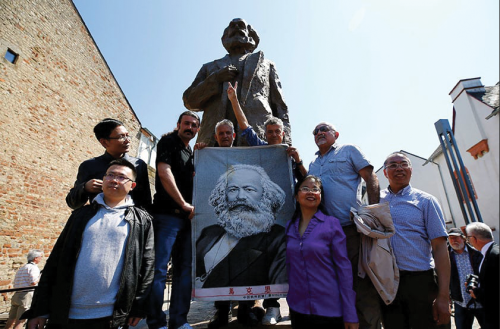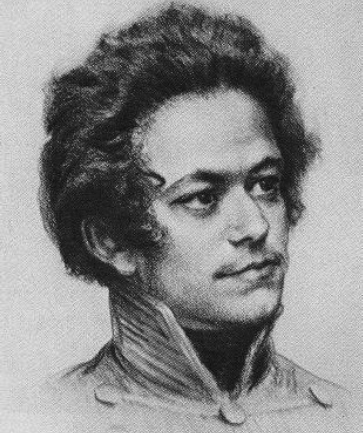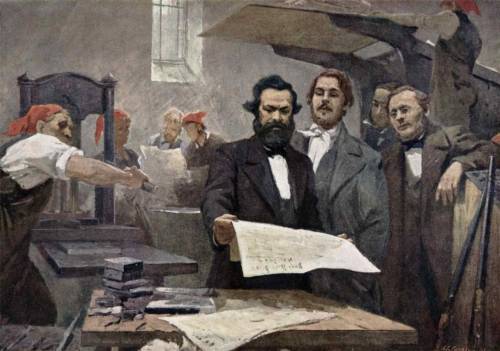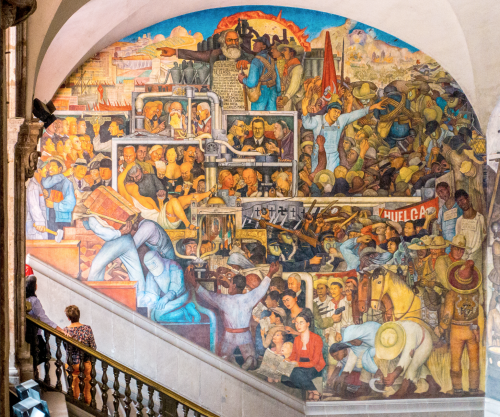The Spark!
Marxist Theory & Discussion
ON THE 200TH ANNIVERSARY OF THE BIRTH OF KARL MARX
By Liz Rowley
[Based on a speech given in Edmonton on May 5, 2018]

People pose in front of bronze statue of Karl Marx created by Chinese artist Wu Weishan to mark the 200th anniversary of Marx’s birth in his hometown of Trier. (5 May, 2018) [Wolfgang Rattay | Reuters]
Karl Marx’s titanic stature in human history derives from his monumental contributions to science, and to scientific socialism, and the theory and organization of the revoultionary working class movement, as well as the organization of the Communist League, and the International Working Men’s Association.
Let us begin this evening, by raising our glasses to Karl Marx, who was born on May 5th, 1818 – 200 years ago today.
As Frederick Engels said at his funeral, a short lifetime later: “His name and his work will endure through the ages.” So it has, and so it will.
Karl Marx’s titanic stature in human history derives from his monumental contributions to science, and to scientific socialism, and the theory and organization of the revolutionary working class movement, the organization of the Communist League, and the International Working Men’s Association – political organizations of the working class that could lead this revolutionary and world-wide struggle for socialism and for communism.
As Engels said at Marx’s funeral,
“Just as Darwin discovered the law of evolution in organic nature, so Marx discovered the law of evolution in human history; he discovered the simple fact […] that mankind must first of all eat and drink, have shelter and clothing, before it can pursue politics, science, religion, art, etc; and that therefore the production of the immediate material means of life and consequently the degree of economic development attained by a given people or during a given epoch, form the foundation upon which the forms of government, the legal conceptions, the art and even the religious ideas of the people concerned have been evolved, and in the light of which these things must there be explained, instead of vice versa as had hitherto been the case.“
"Marx also discovered the special law of motion governing the present-day capitalist method of production and the bourgeois society that this method of production has created”,
Engels continued.
“The discovery of surplus value suddenly threw light on the problem […] which all previous investigators, both bourgeois economists and socialist critics, had been groping (for) in the dark.”*
“Two such discoveries would be enough for one life-time,” said Engels.
“Happy the man to whom it is granted to make even one such discovery. But in every single field which Marx investigated – and he investigated very many fields, none of them superficially – in every field, even in that of mathematics, he made independent discoveries.
This was the man of science. But this was not even half the man. Science was for Marx a historically dynamic, revolutionary force. However great the joy with which he welcomed a new discovery in some theoretical science whose practical application perhaps it was as yet quite impossible to envisage, he experienced a quite other kind of joy when the discovery involved immediate revolutionary changes in industry and in the general course of history. […] For Marx was before all else a revolutionary. His real mission in life was to contribute in one way or another to the overthrow of capitalist society and of the forms of government which it had brought into being, to contribute to the liberation of the present-day proletariat which he was the first to make conscious of its own position and its needs, of the conditions under which it could win its freedom. Fighting was his element. And he fought with a passion, a tenacity, and a success such as few could rival.”

Lithograph of Marx as a student in 1834. [Public Domain]
Marx started life as the son of German Jews, his father a lawyer and his mother of Dutch background. According to his daughter, Eleanor, his favourite authors were Racine and Voltaire, Shakespeare and Homer. He was born in the small German town of Trier and received his university education in Bonn and Berlin, moving from law to philosophy and receiving his PhD degree in 1841. Already critical-minded, he began to write for various liberal newspapers. At the age of 24 he was offered the editorship of one of these – the Rheinische Zeitung in Cologne. His incisive criticism of governmental reaction in its pages infuriated the official censors, until in 1843 the Rheinische Zeitung was closed down by the government.
Marx’s observation two years later, “Philosophers have hitherto only interpreted the world; the point however is to change it,” is universally recognized as a call to action – as a call to link revolutionary theory to revolutionary organization and action.
After a seven-year engagement, Marx married Jenny von Westphalen in 1843, and they moved to Paris, keeping just ahead of the forces of the law. They had several children, two of whom died at a young age, leaving three daughters. All of his daughters were named Jenny after their mother, and with the exception of the eldest daughter, who was known as Jenny, the other two daughters were known by their second names or the affectionate nicknames given to them in the family. Marx’s third daughter, Eleanor Marx was a Marxist writer and agitator in her own right.
It was after his marriage in 1843 that Marx began to write pro-communist theoretical works, the first of which was The Holy Family, which he wrote with Engels. This was a satirical critique of post-Hegelian idealism and his former mentor Bruno Bauer in particular. Shortly after, he moved (under duress) to Brussels, where in 1847 he wrote the lectures later published as Wage Labour and Capital and also The Poverty of Philosophy, in response to Pierre Proudhon’s Philosophy of Poverty, and he joined a conspiratorial hole-in-the-wall organization which became the Communist League. He transformed this organization into a revolutionary vanguard in the short space of three years.
Marx paid the rent from writing articles for various progressive journals, which was generally insufficient, leaving the family in poverty throughout this period of their lives. Marx’s closest friend and collaborator Frederick Engels came to support the family financially, especially after his father’s death, when he was able to take his share out of the family textile business and retire from employment there. Engels also left generous bequests to Marx’s surviving children in his will.
In January 1848 Marx and Engels published the Communist Manifesto, which was the theoretical and political program of the Communist League, just prior to the 1848-49 wave of revolutions across Europe. The Manifesto was written in German, but in the 170 years since then, it has been translated into just about every language in the world. The Manifestofamously declares, in clear and uncompromising words:
“In place of the old bourgeois society, with its classes and class antagonisms, we shall have an association, in which the free development of each is the condition for the free development of all.“
"Let the ruling classes tremble at a Communist revolution. The proletarians have nothing to lose but their chains. They have a world to win. Workers of all countries, unite.”
Marx was just 30 years old when the Manifesto was written.
With Europe in flames, Marx then went back to Cologne and edited the New Rheinische Zeitung (Neue Rheinische Zeitung – subtitled Organ of the Democracy). This newspaper was a revolutionary-democratic opponent of the monarchical government but not a socialist or communist publication, though on the day it was shut down in 1849 its final issue was printed in red ink with an appeal to the workers of Cologne.
As the liberal and democratic revolutions were defeated across Europe, Marx moved to London, where he lived in exile for the rest of his life, spending much of his time writing and communicating with the revolutionary working class movements across Europe and in the U.S.A.
The Communist League survived until 1852, when the Berlin government, now firmly back in power, hunted down its Central leadership, then located in Cologne, arresting and trying them in the Cologne Communist Trials. Seven of their leaders were imprisoned in a fortress with sentences of three and up to seven years. The League was then dissolved by its remaining members, terrorized by the police.
Marx’s theoretical and popular writings, pamphlets, meetings, and agitation in revolutionary circles in Cologne, Paris, Brussels and London did not sit well with the bourgeois governments and ruling classes of Europe that he regularly identified as the source of war, reaction, and social misery, and the main obstacle to social progress and working class advance. This was topped off, as far as Europe’s ruling class was concerned with the formation of the International Working Men’s Association in 1864, as a new wave of working class struggle began to unfold.
Members of the French section of the I.W.A. – the First International – were active in the Paris Commune rising of 1871. This was the first time in history that the working class held power anywhere – if only for a brief two months – before being destroyed and vilified by Europe’s ruling classes. The I.W.A.’s strong defence of the Commune – The Civil War in France, written by Marx – for the first time brought it and him to wide public attention. But the I.W.A. was reluctantly wound up in 1873, as the class struggle waned once more.
While studying at the British Museum, Marx wrote many leaflets and pamphlets attacking, for instance, Lord Palmerston’s government in the U.K. Palmerston posed as a defender of the people internationally, but in fact consistently backed the interests of British capitalism.
It was in the British Museum library also that Marx developed his theory of surplus value first set out in his book, Contribution to the Critique of Political Economy, published in 1859. In 1867 Marx published Volume I of Capital (Das Kapital) in German in the city of Hamburg. The next two volumes were published after his death by his close friend Frederick Engels and have been translated into every major language around the world since.
The collected writings of Marx and Engels, comprising 50 volumes in English, were published, starting in 1975, by a three-way collaboration, including International Publishers of New York.
The Rules of the International Working Men’s Association of 1864 set out the main tasks and objectives of today’s International Communist Movement,
“Considering:
> That the emancipation of the working classes must be conquered by the working classes themselves; that the struggle for the emancipation of the working classes means not a struggle for class privileges and monopolies, but for equal rights and duties, and the abolition of all class rule;
> That the economical subjection of the man of labour to the monopolizer of the means of labour, that is, the sources of life, lies at the bottom of servitude in all of its forms of social misery, mental degradation and political dependence;
> That all efforts aiming at that great end have hitherto failed from the want of solidarity between the manifold divisions of labour in each country, and from the absence of a fraternal bond of union between the working classes of different countries;
> That the emancipation of labour is neither a local nor a national but a social problem, embracing all countries in which modern society exists, and depending for its solution on the concurrence, practical and theoretical of the most advanced countries;
> That the present revival of the working classes in the most industrious countries of Europe, while it raises a new hope, gives solemn warning against a relapse into the old errors, and calls for the immediate combination of the still disconnected movements;
“For these reasons the International Working Men’s Association has been founded.”

Marx and Engels in the printing house of the Neue Rheinische Zeitung, 1848. [E. Capiro | Public Domain]
Two hundred years after Marx’s birth, and one hundred and thirty-five years after his death, the international working class has passed through many trials, many struggles, the most significant of which was the victory of the Great October Socialist Revolution in November 1917 under the leadership of Lenin and the Bolshevik Party. The Russian Revolution sent shock waves through the capitalist world, shaking the capitalist system to its core. To the international working class movement, the red revolution sparked a grassfire of hope, energy and solidarity, and led to the creation of revolutionary Communist Parties around the world. Revolution was in the air, and had to be stamped out in Russia, according to Winston Churchill, who famously called for governments to “smash the Bolshevik eggs in the nest and not wait until Bolshevik chickens are hatched all over the world”. The Canadian government accused Lenin of being a German agent, while the Catholic Church pronounced him to be a devil.
Working people around the world rallied in “Hands Off Russia” campaigns that in many countries, including Canada, involved the trade unions and workers’ organizations of the time. In Alberta, this included the Alberta Federation of Labour which in February 1919 unanimously passed a resolution in support of the Russian Revolution, which read, in part:
“Resolved that that this convention of the Alberta Federation of Labour places itself on record as being in full accord and sympathy with the aims and purposes of the Russian and German socialist revolutions, and
"Be It Further Resolved that this convention gives the incoming executive officers full power to call a province-wide general strike should the allied powers persist in their attempt to overthrow the Soviet administration in Russia or Germany or in any country in which a Soviet form of government is or may be established.”
Heady stuff indeed! When Marx died in 1883 there had been another massive outpouring of grief and tributes from all over the world. One of the biggest events was held in New York at the Cooper Union Meeting, where thousands were turned away because the hall couldn’t hold all those who came to offer their respects and hear the tributes.
Since the overthrow of socialism in the USSR and a large part of the socialist system of states, imperialism has crowed – once again – that socialism is dead, that Marxism is dead – that capitalism is eternal – that we have reached the end of history.
The people of Cuba would disagree – now in the 60th year of their socialist revolution – just 90 miles away from US imperialism – from the Empire.
The people of China would also disagree – now in the 70th year of their socialist revolution – with a quarter of the world’s population, a rapidly expanding economy, and holding more than $1.17 trillion of US government debt.
The people of Vietnam would disagree, 43 years after militarily defeating the U.S. – the most powerful imperialist country in the world.
The people of the DPRK of North Korea would also disagree, as they reject US imperialism’s threats to “totally destroy” the Korean Peninsula – threats made by Trump at the UN last winter as his campaign for “regime change” went full-tilt.
The people of Syria, Yemen, Iran, Palestine, Libya, Venezuela, Brazil, and many other countries seeking their own path of social and economic development, independence, and sovereignty, including some who choose the socialist path, would also not agree. These countries and peoples too are threatened with regime change, or are already facing the US war machine and US aggression.
And what about Canada? Working people across Canada are also facing a foreign policy of active involvement in US / NATO and EU dirty wars. We are being told that military spending will increase by 70% this decade, along with more financial commitments to NATO – imperialism’s global army. Workers are facing real levels of unemployment that are startling, and real wages that have fallen or stagnated while prices and corporate profits have skyrocketed. This is the reality in the advanced capitalist countries today. This is what is underneath workers’ growing anger with capitalist governments, corporations, and institutions. Their anger is well-founded, and has found outlets in the Occupy movement, in Idle No More, in the Women’s march, in the Quebec student strike, in the illegal US teachers’ strikes, and in the rising of the Indigenous peoples. It’s found a voice in widespread support for Bernie Sanders in the U.S., and for Jeremy Corbyn in the U.K., people who call themselves socialists though they are not scientific socialists, they are not Marxists, and they do not call for overthrowing the capitalist state and instituting social ownership of the economy. Yet they reflect the growing interest in socialism around the globe, and the growing demand for fundamental social change.
In fact, Marx’s laws of capitalist development are being exposed in horrendous full colour and detail, as US imperialism dictates how the world’s peoples, nations and states will live or when and how they will die. The conditions of the working class, even in the most developed capitalist countries, have deteriorated to the point that force and war are increasingly the tools capitalist governments reach for to maintain the rule of capital in their countries. In Europe, far-right and fascist parties are electing MPs and governments, while right-wing populism and reaction – linked to far-right and fascist forces – are gaining ground in Canada and the U.S.
For millions, including millions in the advanced capitalist countries, capitalism isn’t working. Working people are desperately searching for an alternative, expressed in the idea that “another world is possible”. We can add – “and urgent.”
Nuclear war and irreversible climate change are new phenomena since Marx’s time, which have objectively speeded up the necessity of revolutionary transformation. What is missing is the mass influence of the revolutionary movement and the consciousness on the part of the working class of its historic mission to overthrow capitalism, and to establish working class power: socialism.
This revolutionary movement has not died out as a result of the great loss of the USSR and the other socialist states of the twentieth century, but it has been ferociously attacked, vilified, distorted and undermined by the actions of imperialism globally and in each country. The history of socialism has been distorted and perverted, the role of the world’s Communist and progressive movements has been distorted and perverted, as imperialism desperately seeks to extend its life, and continuously expand its rate of profit.
As Marx noted, there are waves in the class struggle which count as setbacks and advances for the working class and its allies through history. The current defensive position of the working class is historically temporary because capitalism cannot survive its built-in contradictions. It has produced its own grave-diggers: the working class; it has outlived its usefulness and is rotting. But it will not fall of its own accord. It requires the active conscious revolutionary action of the working class to finally topple it and to create a new society in which exploitation and oppression are assigned to the garbage bin of history.
The good news? Capitalism is already pregnant with socialism!

Left panel of the "History of Mexico” mural by Diego Rivera on a stairway of the Palacio Nacional (National Palace) in México City. (2012) [Public Domain]
When Marx died, Engels said at his graveside, “Marx was the best hated and most calumniated man of his time.”
The revolutionary Wilhelm Liebknecht responded:
“True. He was the most hated, but he was also the most loved. Most hated by the oppressors and exploiters of the people; best loved by the oppressed and exploited, as far as they are conscious of their situation.”
Our job today is make the oppressed and exploited conscious of their situation, and armed with scientific socialism, to win socialism in Canada and around the globe.
Workers of the world unite! You have nothing to lose but your chains!
We have a world to win!
* This is a reference to Marx’s scientific insight that rent, interest and profit can all be considered together as the proceeds of exploiting workers’ labour, though divided among different capitalists. In a letter to Engels written on August 24, 1867, after sending the corrected proofs of Capital to the publisher, Marx wrote,
“The best points in my book are:
1. the two-fold character of labour according to whether it is expressed in use-value or exchange-value […]
2. the treatment of surplus-value regardless of its particular forms as profit, interest, ground rent, etc. […]
The treatment of the particular forms in classical political economy, where they are for ever being jumbled up together with the general form, is an olla potrida [a hotchpotch].”
(Karl Marx and Frederick Engels Collected Works, Volume 42, page 407.)
Liz Rowley is the leader of the Communist Party of Canada.
JUN. 22 2018
#KARL MARX #MARX200 #SOCIALISM #COMMUNISM #COMMUNIST PARTY OF CANADA
Home
Archive
COMMUNIST PARTY OF CANADA
Aucun commentaire:
Enregistrer un commentaire